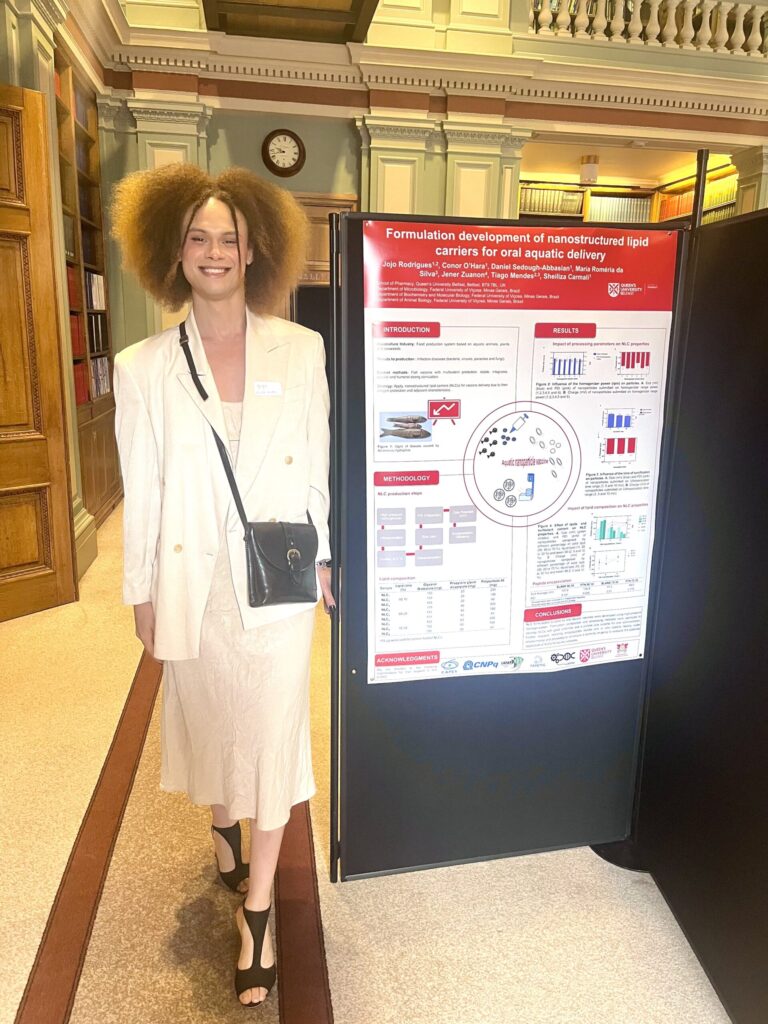Jojo Rodrigues, a PhD student in the Graduate Program in Agricultural Microbiology, is about to finish her sandwich internship at Queens University of Belfast in Northern Ireland. In August, she returns to Brazil with the knowledge and technology to nanoencapsulate the fish vaccines she is developing under the guidance of Professor Tiago Mendes at the Molecular Biotechnology Laboratory (LBM). In May, she took some of the results of her experiments in Ireland to Formative Formulation, a conference held by the Royal Society of Chemistry in London. “I’m very pleased. I’m sure I’ll return to Brazil as a better, more focused researcher, ready to further enhance the excellence of the work we’ve done together in Brazil.”
Jojo’s time abroad was a long-standing desire, and it began to emerge from the demands she found in the studies carried out in Brazil. “We started a line of research into an oral vaccine for fish, with a focus on tilapia. Beekeeping suffers significant losses to diseases caused by bacteria, and this is relevant because most of the fish consumed by humans comes from beekeeping. It’s a sector that therefore needs vaccines. But currently, most of them are injections, which makes the process very difficult,” she explains. The first steps were successfully completed in Brazil, and the group developed and tested a peptide-based oral vaccine with good results. But the combination of the characteristics of the vaccine and the fish’s organism requires that the product be “protected” until it is digested. “The fish organism, by characteristic, has a series of barriers in the gastrointestinal tract where this protein can be degraded. So we opted for nanoencapsulation. And the nanoencapsulation technology I’m learning is here.”
Jojo is attached to the Queens School of Pharmacy, which is a world reference in nanoencapsulation, and works under the guidance of Professor Sheiliza Carmali. “We want lipid-based encapsulation, because our delivery has to be in aquatic environments. I’m working with two specific types of lipid nanocapsule – one based on solid lipids, and another that combines solid and liquid lipids,” she explains. In this final stretch of her activities in Ireland, the researcher has been concentrating on stability tests. “My goal is to find out to what extent our vaccine is intact, to what extent it maintains its structure. And when I return to Brazil, it will be time for oral tests.”
This is the first time Professor Sheiliza has collaborated with the PPGMBA, but other opportunities are already beginning to emerge. “She received us very well and seems to like the results so far. She’s even now in a closer partnership with Professor Tiago to bring other students, and she’s also wanting to go to Brazil and spend a few months with us.” It was the professor who suggested that Jojo take the results of her work to the Royal Society of Chemistry conference. “There were researchers from various fields there, working in renowned companies, formulating products to be delivered to shelves. It was very nice, I was able to present my work. Everyone was surprised by the idea of fish and vaccines.”
Having been in Europe for almost a year now, Jojo celebrates the good experience, but makes a point of highlighting Brazil’s many merits. “My experience here has been excellent, but we tend to overestimate Europe and put Brazil too low. And I found out that Brazil is very good,” she says, referring to the quality of the research carried out and the environment of Brazilian universities. “There are many challenges, cultural and personal, and I, as a trans woman, experience some very specific ones. Being away from home makes you more vulnerable, although the experience is very valuable.” In academic terms, Jojo says she was surprised at how quickly she felt adapted and capable. “I arrived much better prepared than I imagined. Brazilian universities are putting on a show. When I arrived, I was intimidated, but I saw that our university and our PPG, in particular, prepare us very well. As well as being scientifically well-founded, we’re very proactive, quick, agile, and that’s worth a lot.”


Leave A Comment